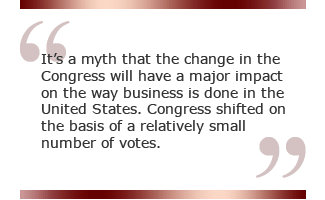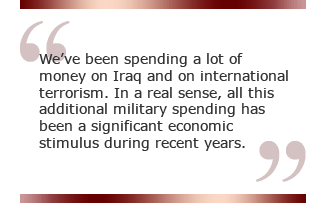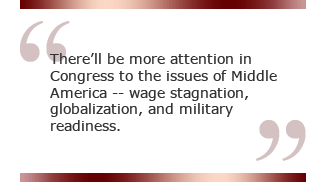"We have to push things like earmarks. We have to focus aggressively to reduce spending in Washington. Tax reform is another one. Immigration reform." So said a leading political operative in an interview shortly after the midterm elections when asked about his party's agenda for the new Congress. Sounds like that operative is reading from the Democratic playbook, right?
Actually, the quote comes from former Republican National Committee Chairman Ken Mehlman. A year ago, he didn't necessarily sound so much like the new House speaker, Nancy Pelosi. But that was before the "thumpin'" the previously dominant GOP received in the midterm elections. Since then, the Republicans have been working hard to make themselves look like the party of reform and prudence, while the Democrats are just as busily fashioning their image as one of industriousness and accountability (witness the new five-day congressional workweek).
 |
So, while both parties are reshaping their political identities, a key question remains: Which one is better for the economy? It's hard to tell these days, as traditionally pro-business Republicans push for seemingly anti-corporate measures like trade tariffs and an end to cheap immigrant labor, while Democrats call for a return to fiscal responsibility -- long a GOP rallying cry. Executives are left wondering whether the new Congress will help the economy or hamper it.
Relax, says Dennis Jacobe, Gallup's chief economist. There will be a lot more sound and fury and some symbolic legislation coming from Capitol Hill, but Congress won't do much that will significantly influence the business climate -- at least in the short term -- because it can't do much in a divided government controlled by a Democratic Congress and a Republican president. Furthermore, Jacobe predicts that the new Congress will not have a negative effect on the business and investment climate, will not gain control of federal spending and the federal budget deficit, and will not have a significant impact on globalization.
In fact, according to Jacobe, businesspeople shouldn't lose sleep over what Congress might do that could hurt the current business and investment climate. Instead, executives should be worrying about what Congress will do about what he calls the "stealth issue" facing the new Congress in 2007.
GMJ: Democrats have traditionally been seen as the pro-worker and pro-consumer party, while Republicans have been perceived as the party of business and investors. Does that imply that the change in congressional leadership from Republican to Democrat will be bad for business and investors?
Dennis Jacobe, Ph.D.: I would say that is something of a myth. For example, as part of the UBS-Gallup Index of Investor Optimism survey in December 2006, we asked investors how they thought the change in congressional leadership from Republican to Democrat will affect the overall investment climate: 38% said the change in congressional leadership will have a positive impact, 28% said it will have a negative impact, and 32% said the change will have no impact at all. Thus, investors as a whole don't seem to think that the change in leadership from the Republicans to the Democrats will hurt the overall investment climate, and I tend to agree.
GMJ: Why not?
Jacobe: For the same reason that "all elections are local." Every congressman and every senator has key interests in his or her state or district. Sometimes, these interests mean that members end up favoring business, and sometimes it results in their supporting other interests like environmental groups. So representatives at all levels have to reflect the interests in their districts or their states if they want to get re-elected, whether they're pro-business-related or not.
GMJ: Do you think that the new Democratic Congress will change things at all?
Jacobe: At this point, it's another myth that the change in the Congress will have a major impact on the way business is done in the United States. Congress shifted on the basis of a relatively small number of votes; as a result, the margin that the Democrats have is very small, and they realize that margin can be shifted very easily in the next election or even by special circumstances. And the president is of the opposite party. All of those arguments suggest that there won't be a radical shift in policies anytime soon.
On the other hand, I do think you will have a great deal more sound and fury coming from the Congress concerning a number of populist issues. For example, if gas prices surge again in 2007 the way they did in 2006, I think Congress will be much more aggressive about investigating and holding hearings concerning the major oil companies and their profits.
GMJ: Would you agree that the midterms were a referendum on the Republican leadership, primarily President Bush -- that the Democrats didn't win so much as the Republicans lost?
Jacobe: I think that's partly true, but there are other more widespread issues. The politicians and many political observers say that the election was a referendum on the situation in Iraq. From an economic perspective, however, there are a couple of fascinating issues involved.
 |
When the price of oil and gasoline dropped dramatically a couple of months before the election, I assumed that would be great for the Republicans -- Congress and the president were taking a terrible hit because of high gas prices. But as the public's focus on high gas prices moderated, people began to focus with more intensity on Iraq instead. So in a strange way, as the debate over the economy -- and the degree to which you can hold any politician responsible for high gas and oil prices -- receded, the Iraq situation became much more prominent. Ultimately, I don't think falling gas prices did Republicans any good; in fact, it may have done them some harm.
The other thing, which we picked up in The Gallup Poll, was that the average American doesn't feel like the economy is going well, although the economic indicators suggest that it has been going well the last several years. And I think that underlying perception played a part, even though Iraq was the headline-getter. [See "No Sign of Uptick in Consumer Views of the Economy" in the "See Also" area on this page.]
GMJ: I assume you're referring to wage stagnation. Can Congress do anything about that?
Jacobe: The new congressional structure is politically set up for inaction -- that tends to be true when you have divided government and small margins. So I don't think the new Congress can affect wage stagnation in the short term.
However, I think there's more recognition, perhaps, from the new members of Congress about why the average American's perceptions of the economy and wages are so negative when Wall Street is booming. As a result, there might be an increased sentiment to try to do some things that indicate to the public that the new Congress understands the strains on the average American -- that's where increasing the minimum wage fits in. Of course, you may hear a lot more about healthcare, healthcare costs, and those kinds of things, where both business and labor agree there is a problem.
Now, we may also find that the president and the Congress will agree on some issues. For example, we'll probably get an increase in the minimum wage soon. It's an easy thing for Congress and the president to do, and the opposition to it is really not that focused. And it's possible they could get together on illegal immigration. [See "A Minimum Wage Hike: The Real Impact" and "The Real Impact of Illegal Immigration" in the "See Also" area on this page.]
It's doubtful whether they can do anything significant that will affect the basic economic dynamics that are taking place as a result of globalization. There's been some talk about education tax credits, and that's a reasonable probability. The economic effects of such credits are not clear, but I think the idea that reducing the student loan rate is a way of helping Americans become better educated is one reasonable response to globalization that probably crosses the political spectrum.
GMJ: Speaking of globalization, what do you think the Democrats will do about trade barriers or tariffs? There's been a lot of strange cooperation between parties -- Senators Charles Schumer, a Democrat, and Lindsey Graham, a Republican, are both anxious to slap protective barriers on Chinese goods.
Jacobe: Well, I think globalization is one of those issues that cross party lines. I believe almost everyone across the political and economic spectrum agrees that raising tariffs and creating trade barriers is just not good for the U.S. or world economy.
GMJ: That's not what Lou Dobbs says every night on TV.
Jacobe: At the same time, however, there is a growing recognition that international trade is a lot more complicated than the "free trade" slogan suggests. For example, our national distaste for tariffs and trade barriers doesn't mean that there aren't other actions we can take as a nation to right the current trade imbalance.
One of the most obvious has to do with the value of the Chinese yuan, because it is clear that the Chinese have undervalued their currency, and as a result, are able to underprice around the world -- and particularly in the United States. The change in Congress may create some increased pressure for currency liberalization, but I wouldn't expect anything dramatic.
But, you're right: The new Congress seems to be more populist, and as a result, may tend more toward protectionism, toward trying to equal trade balances and competition. For example, the new Congress may seek new international trade concessions to help balance things. And that's not dramatic, or even unusual. I believe India restricts foreign ownership of companies. China restricts foreign ownership by economic sector and also has restrictions on the percentage of a company that can be held by foreign owners. Intellectual property rights are not widely recognized in Asia.
The sentiment of the average American is reflected by the new Congress on these international trade issues, and the existence of that view might be used to create some increased leverage during international trade talks. But, I don't expect anything dramatic, because the Congress will not be looking at dramatic changes.
GMJ: The president will probably veto new taxes, and this Congress will probably let Bush's tax cuts expire when they come up for renewal. What economic effect will that have?
Jacobe: Not much, in the short term. The tax cuts were timed to expire after the next presidential election. So I'm not sure their expiration will have an immediate impact, although some will argue that tax planning will be affected. If Congress were to do something immediate that changed the way dividends were taxed or raise the tax rate on upper-income individuals, that could have a significant impact on the economy, but none of that is very likely in the short term.
GMJ: The federal deficit is almost $9 trillion. Will a Democratic Congress have any effect on the debt, do you think?
Jacobe: Well, there are split opinions about what kind of effect that debt has on the economy. And, I think this is another issue that goes across party lines. The federal budget deficit and the national debt have been issues for many, many decades. Still, there remains an ongoing argument about whether or not economic growth or higher taxes is the best answer to reducing the federal budget deficit.
There are many economic debates that surround the federal budget deficit and the national debt. Our investor surveys say that the budget deficit is now one of the biggest issues that concerns investors as a group. As energy prices have declined as an issue, international concerns and the federal budget deficit have come up to about the same level as concerns over energy prices. [See "Investor Optimism Surges to Match High for the Year" in the "See Also" area on this page.]
One side's argument is like that made by [former Treasury Secretary Robert] Rubin -- that we need to increase taxes to reduce the debt -- but there's a very strong group of people who are opposed to any increase in taxes. Republicans tend to be split on the issue. Some Republicans are with the pro-growth group, finding increased taxes an anathema, while other Republicans find the lack of federal budget discipline to be the major problem. Democrats tend to be split too. They have a variety of spending priorities, but some Democrats believe that those have to be paid for, while other Democrats are not as concerned about getting higher revenues to pay for their spending priorities.
 |
Whether you can get a true return to federal budget discipline is a completely different issue. At one time, Congress got the deficit way down; it eliminated it by cutting spending in some areas to increase it in other areas -- the "paygo" idea. And that concept is attractive. Whether you can get a political coalition behind it is another issue.
GMJ: Fiscal conservatives have been extremely unhappy with the congressional GOP's lack of fiscal discipline, and some are placing their hopes in stingy Democrats. Odd, isn't it?
Jacobe: Yes. When the Republicans were in power, there clearly was no spending discipline in Congress. So it's somewhat strange for people to think that the Democrats, who tend to have less spending discipline historically than the Republicans, will change things.
GMJ: Do you think the Democrats can slow or reverse the war in Iraq? And if so, what effect will that have on the economy?
Jacobe: Just by the ability to hold hearings and focus on some of those issues, Congress can put pressure on the administration for change in Iraq. They may force a focus on the financial cost of the war, which has not been well-articulated in the past; the cost is probably underestimated by most people. But, I don't look for anything dramatic like a cutoff of funding for the war. That would be seen as a failure of the Congress to support our troops.
The interesting thing is that from an economic perspective, we've had a "guns and butter" economy, like we did in the Lyndon Johnson days. It's not as stark as it was then, because we don't have the inflation we had in those days. But we've been spending a lot of money on Iraq and on international terrorism. In a real sense, all this additional military spending has been a significant economic stimulus during recent years.
In fact, I think the whole issue of future military spending may be the "stealth issue" that surfaces during the new Congress.
GMJ: What do you mean when you say military spending is a stealth issue?
Jacobe: The cost of the war in Iraq and the war on terrorism has been largely financed by increasing our deficit spending. Worse yet, we have used up a lot of our existing military resources without replacing them. And now, discussions of troop levels in Iraq have opened the whole issue of our nation's need to increase the size of the U.S. military or alter its mission.
For the past several years, these issues have been off the congressional radar screen, but with the new Congress, they could not only show up in 2007, but actually become a major political issue. In this way, the new Congress could really end up confronting the "guns and butter" issue.
GMJ: So will Democrats choose butter instead of guns? And if they do, what will it mean for the economy in 2007?
Jacobe: From an economic perspective, the real issue is whether Congress can do what is necessary to rebuild or even expand the U.S. military, and at the same time, develop a significant degree of spending control. History suggests that is not very likely.
But the important thing is that this congressional election wasn't as much a change from one party to another as a shift to a more populist sentiment -- though on the surface, it may seem like they've swapped platforms. The new congressmen and congresswomen have more of a populist strain than the members they replaced. So there'll be more attention in Congress to the issues of Middle America -- wage stagnation, globalization, and military readiness.
My guess is that the Democrats will hold a lot of hearings and make a lot of news. But, they won't be able to solve the federal deficit problem or significantly address wage stagnation or globalization. Instead, I think they'll open up all of these issues with the hope of using them to expand their congressional margins and gain the presidency in 2008.
-- Interviewed by Jennifer Robison